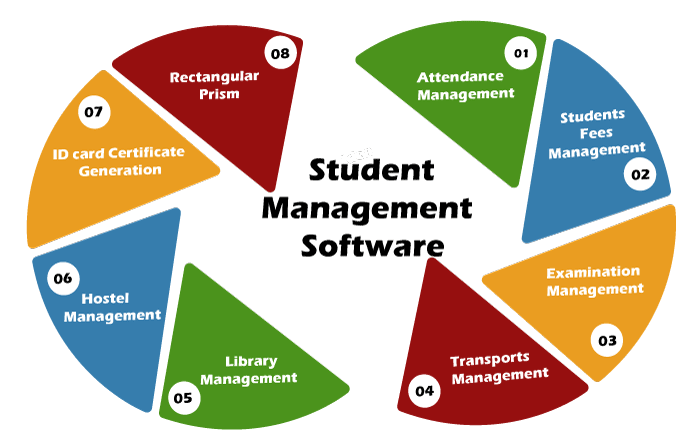Benefits of Using Student Management System

Implementing a Student Management System (SMS) offers numerous benefits to educational institutions, administrators, teachers, students, and parents.
Here are some key advantages:
-
Centralized Data Management:
- An SMS centralizes student information, academic records, and administrative data in a single platform. This makes it easier to access, update, and manage information without the need for extensive paperwork.
-
Efficient Admissions Process:
- Streamlining the admissions process through an SMS simplifies online applications, document submissions, and admission tracking. It reduces manual efforts and minimizes errors in handling admission-related paperwork.
-
Attendance Automation:
- Automated attendance tracking helps teachers and administrators monitor student attendance more efficiently. It reduces the time and effort required for manual attendance marking and allows for real-time tracking.
-
Grading Accuracy and Transcript Generation:
- An SMS automates the grading process, calculates GPAs, and generates transcripts accurately. It ensures consistency in grading and provides a reliable record of student academic performance.
-
Class and Exam Scheduling Optimization:
- The system helps in creating optimized class schedules, exam schedules, and assignment deadlines. It minimizes conflicts, optimizes resource utilization, and ensures a smooth academic calendar.
-
Improved Communication:
- Communication between teachers, students, and parents is enhanced through messaging features within the SMS. Important announcements, assignments, and other information can be shared easily, fostering better communication.
-
Fee Management and Online Payments:
- Efficient fee management features in an SMS simplify the collection of student fees, manage fee structures, and generate fee-related reports. Online payment options make the process convenient for parents.
-
Library and Resource Management:
- The SMS facilitates the management of library resources, including cataloging, check-in/check-out, and tracking overdue books. It ensures efficient use of educational resources.
-
Enhanced Security and Access Control:
- An SMS provides secure access to sensitive student and administrative data. Access control mechanisms allow administrators to define roles and permissions, ensuring that only authorized personnel can access specific information.
-
Extracurricular Activity Tracking:
- The system helps track and manage student involvement in extracurricular activities, clubs, and events. It provides a comprehensive view of students' holistic development.
-
Improved Decision-Making with Analytics:
- Reports and analytics generated by the SMS offer insights into student performance, attendance trends, and other key metrics. This data can inform decision-making and help in identifying areas for improvement.
-
Mobile Accessibility:
- Many SMS solutions offer mobile-friendly interfaces or dedicated mobile apps, allowing stakeholders to access information on the go. This enhances accessibility for students, parents, teachers, and administrators.
-
Time and Cost Efficiency:
- By automating routine administrative tasks and reducing paperwork, an SMS saves time and resources. This allows educational institutions to focus more on delivering quality education.
-
Parental Involvement:
- Parents can actively engage with their child's education through the SMS. Access to real-time updates on attendance, grades, and other information encourages parental involvement in the learning process.
-
Scalability and Flexibility:
- A good SMS is designed to be scalable and flexible, accommodating the evolving needs of educational institutions. It can adapt to changes in student enrollment, curriculum, and administrative processes.
In summary, a well-implemented Student Management System brings efficiency, accuracy, and transparency to various aspects of educational administration. It promotes collaboration among stakeholders and contributes to an improved overall educational experience.
Thank you.
